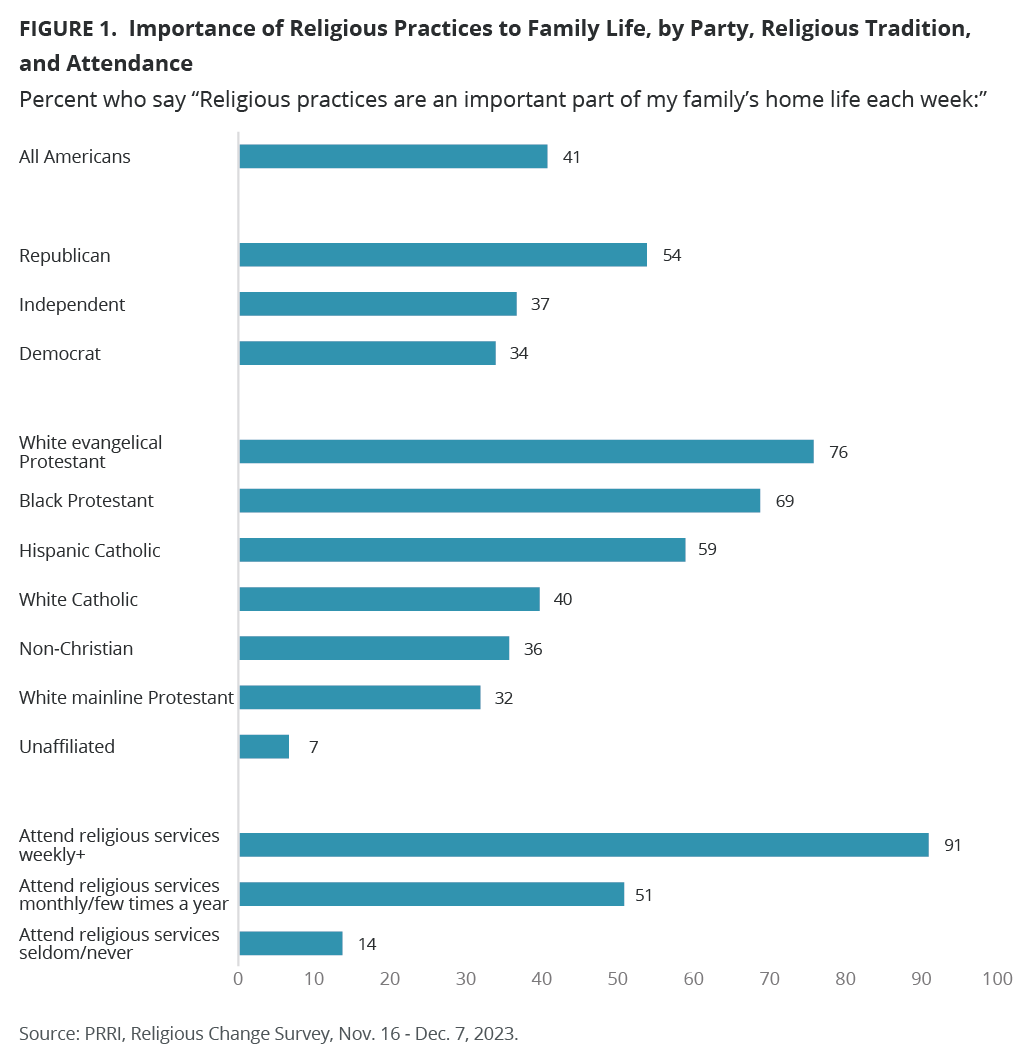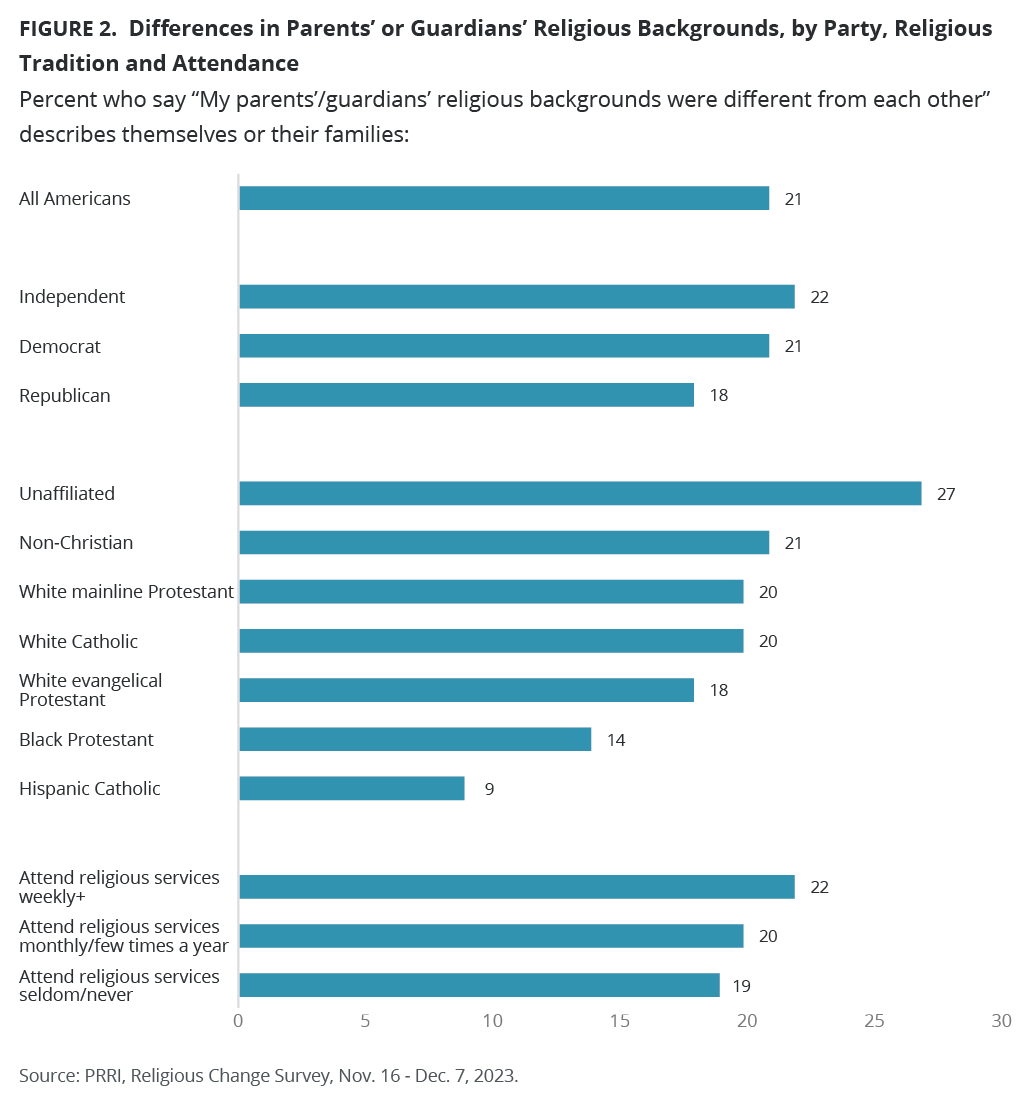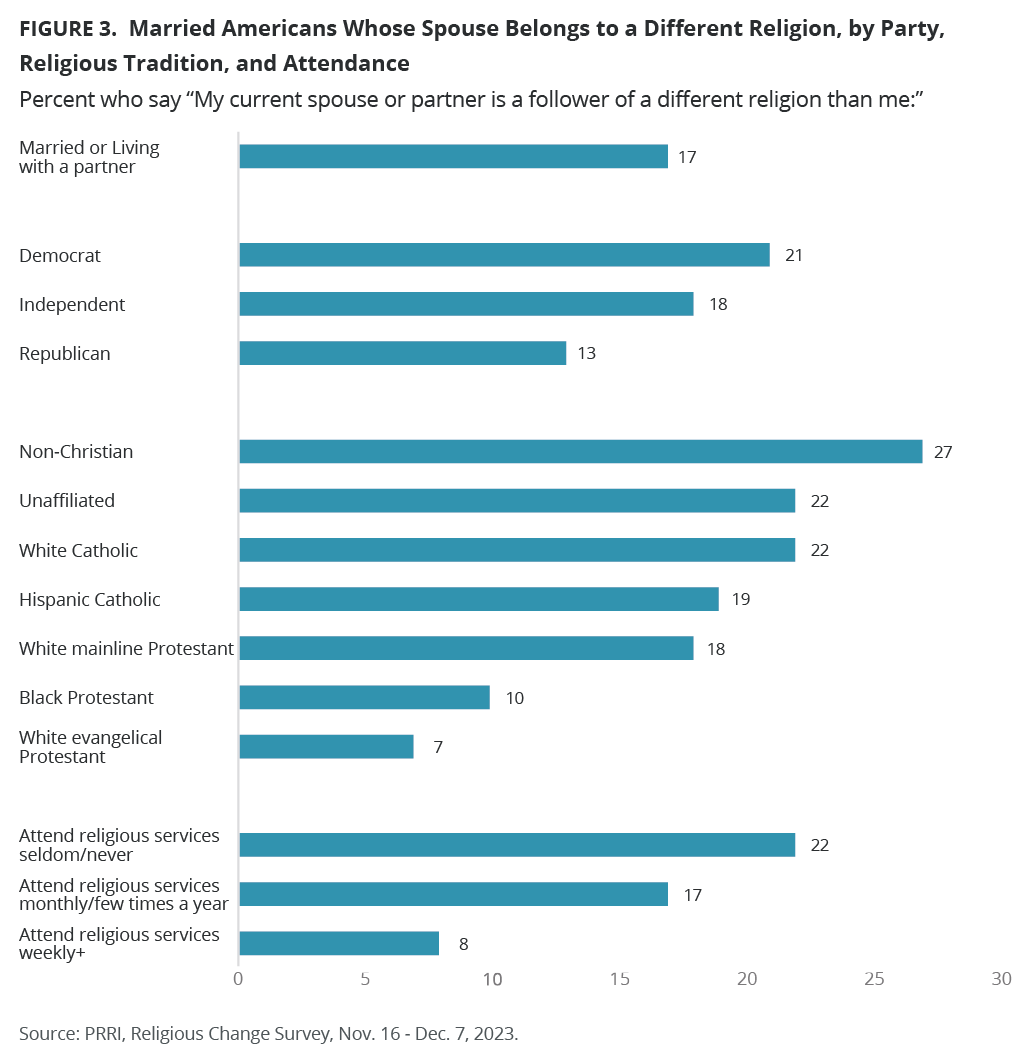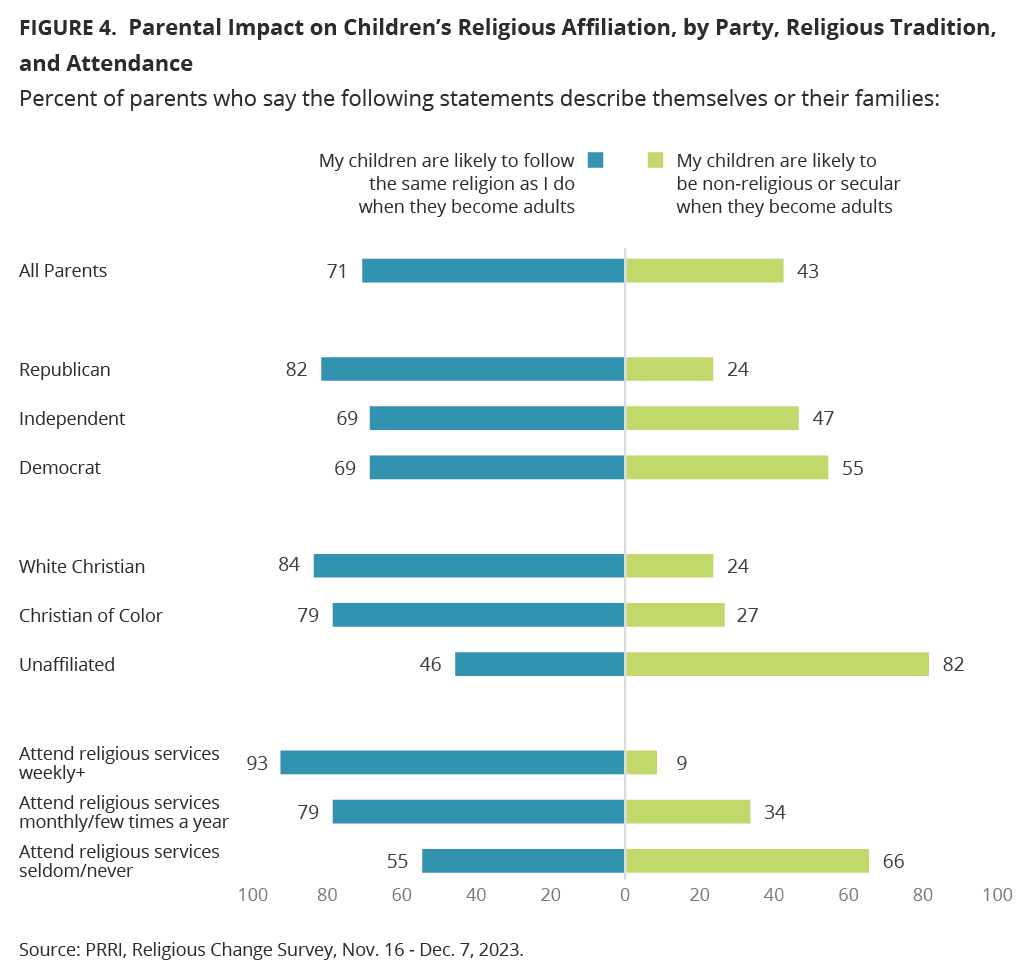A recent PRRI survey examined Americans’ experiences with religion. This Spotlight Analysis considers the role religion plays in family life, the prevalence of interfaith and interreligious households, and the extent to which parents believe their children will maintain their same faith affiliations as adults.
How Important Is Religion to Family Life?
Around four in ten Americans (41%) agree with the statement “Religious practices are an important part of my family’s home life each week.” Three-quarters of white evangelical Protestants (76%) say that religious practices are an important part of their family’s home life each week, as do broad majorities of Black Protestants (69%) and Hispanic Catholics (59%). In contrast, around four in ten white Catholics (40%) and individuals who identify with non-Christian religions (36%) and three in ten white mainline/non-evangelical Protestants (32%) say religious practices are important to their family life each week.[1] Unsurprisingly, less than one in ten religiously unaffiliated Americans (7%) agree with this statement.
The vast majority of Americans who attend religious services at least once a week (91%) agree that religious practices are an important part of their family’s home life each week. Just over half of those who attend religious services at least a few times a year (51%) and only 14% of those who seldom or never attend religious services say that religious practices are important to their weekly family life.
Along partisan lines, Republicans (54%) are significantly more likely to say religious practices are an important part of their family’s home life each week than independents (37%) or Democrats (34%).
Additionally, there are differences in opinion by marital status. Over half of Americans who identify as widowed (55%) agree that religious practices are an important part of their family’s home life each week. Comparatively, around four in ten married Americans (44%) and divorced or separated Americans (40%) report religious practices as important to their home life each week. One-third of Americans who reported themselves as single and never been married (34%) agree with the statement.

Religious Diversity in American Families
Parents’ or Guardians’ Differences in Religious Backgrounds
Around two in ten Americans (21%) say that their parents’ or guardians’ religious backgrounds were different from each other. Unaffiliated Americans (27%) are the most likely to have parents with different religious backgrounds, compared with around two in ten non-Christian Americans (21%), white mainline/non-evangelical Protestants (20%), white Catholics (20%), and white evangelical Protestants (18%). Fourteen percent of Black Protestants and 9% of Hispanic Catholics say their parents’ or guardians’ religious backgrounds were different from each other.
Similar percentages of those who attend religious services seldom or never (22%), at least a few times a year (20%), and at least once a week (19%) report having parents from different religious backgrounds. There are no significant differences along partisan divides or marital status.

Interreligious Relationships Among Married and Partnered Americans
Nearly two in ten Americans who are currently either married or living with a partner (17%) say that their spouse or partner has a different religious affiliation than themselves.[2] More than one in four non-Christian Americans (27%) who are currently married or living with a partner say this as do around two in ten white Catholics (22%), unaffiliated Americans (22%), Hispanic Catholics (19%), and white mainline/non-evangelical Protestants (18%). Lower shares of Black Protestants (10%) and white evangelical Protestants (7%) say that their spouse or partner has a different religious affiliation than themselves.
Married or partnered Americans who seldom or never attend religious services (22%) are more likely to say their spouse or partner has a different religious affiliation than those who attend at least a few times a year (17%) or at least once a week (8%).
Along partisan lines, around two in ten Democrats (21%) and independents (18%) say that their spouse or partner is from a different religious background and around one in ten Republicans (13%) say the same.
Looking at the likelihood of being in an interreligious relationship by religious affiliation, there is a notable contrast between the experiences of Hispanic Catholics and white evangelical Protestants. While only 9% of married or partnered Hispanic Catholics have parents from different religious backgrounds, nearly two in ten Hispanic Catholics have a spouse or partner with a different religious affiliation than their own (19%). Among white evangelical Protestants, this is reversed; only 7% of white evangelical Protestants have a partner or spouse of a different religious affiliation than their own, compared with 18% who have parents from different religious backgrounds.

Parental Impact on Children’s Religious Affiliation
Most parents who are white Christians (84%) or Christians of color (79%) say that their children are likely to follow the same religion as they do.[3] In contrast, unaffiliated parents are more split with slightly under half (46%) saying that their children are likely to maintain similar religious views as they do.[4]
Most parents who attend religious services at least once a week (93%) or at least a few times a year (79%) agree that their children are likely to follow the same religion as their own, compared with a slim majority among those who seldom or never attend (55%).
Unaffiliated parents (82%) are three times more likely to say that their children are likely to be non-religious or secular when they become adults than parents who are white Christians (24%) or Christians of color (27%).
Parents who seldom or never attend religious services (66%) are about twice as likely as parents who attend at least a few times a year (34%) and seven times as likely as parents who attend religious services at least once a week (9%) to say that their children are likely to be non-religious or secular when they become adults.
There is a clear partisan divide among parents on the religious future of their children. Eight in ten parents who identify as Republican (82%) say their children are likely to follow the same religion as they do when the children become adults. Seven in ten parents who are Democrats (69%) and independents (69%) say this. This pattern continues with Democratic (55%) and independent (47%) parents being more likely to say their children are likely to be non-religious or secular as adults than Republican parents (24%).
Additionally, married Americans (74%) are more likely to say their children will follow the same religion they do when they become adults than divorced (66%) and single, never married (57%) Americans. There is no significant difference in opinion about children being non-religious as adults by marital status.[5]

[1] This question was asked only to those who are currently married or living with a partner.
[2] Non-Christian religions include Judaism, Islam, Buddhism, Hinduism, Unitarian Universalist, and all other non-Christian religious affiliations.
[3] Religious groups were collapsed due to small sample sizes. White Christians include white evangelical Protestants, white mainline/non-evangelical Protestants, white Catholics, white Jehovah’s Witnesses, white Latter-day Saints, and white Orthodox Christians. Christians of color include Black Protestants, Hispanic Protestants, other Protestants of color, Hispanic Catholics, other Catholics of color and Jehovah’s Witnesses, Latter-day Saints, and Orthodox Christians of color. Non-Christian groups are too small to report.
[4] These results may point to a different understanding of “religion” among unaffiliated Americans.
[5] Numbers for widowed parents are too small to report.






